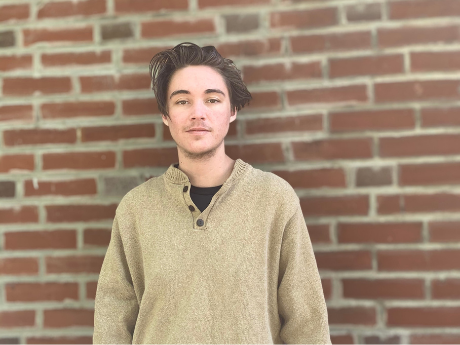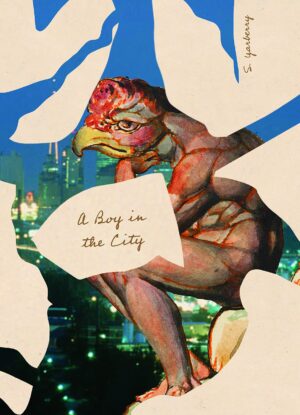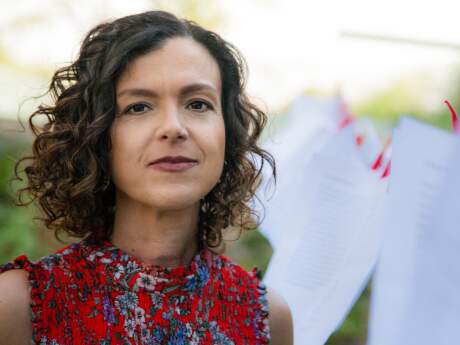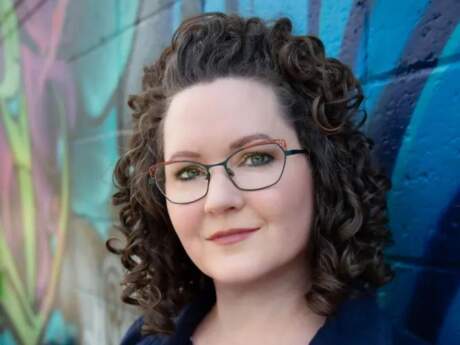In Their Own Words
S. Yarberry on “Stage Directions”

Stage Directions
A world of fragment is my private life.
A world, though, is just the world to the public.
If my life is a field then it’s a dirt field.
Regular, and bearing all dragged through it.
Marked, is what I mean. The dirt harrowing.
Now, I’m all about the exterior. Earnestly,
here: the day’s great sweat: full throttle
and fragrant—the sky dark like an animal’s
eye. Odd fruit at odd angles. A small dog
barking. Rain coming down. Street lights.
A stack of bricks for no good reason.
In another room you read Perec, touching
your own gold sorrow like a pet. Get used
to using each other, one guy once said.
The wind rubs through trees. Dumpsters
like bad urns upon the asphalt. I drink
a spritzer. A night time spritzer. This is all
for the public. All of it. Inside, though, think:
course-core-coarse-corps-body-death.
The drink going down cool.
The rain coming down like a violence.
From A Boy in the City (Deep Vellum, 2022). Copyright © 2022 by S. Yarberry. Reprinted with permission of the publisher.
On “Stage Directions”
It was springtime in St. Louis, MO and, as usual, we were met with a perpetual series of thunderstorms. It was hot. I had just moved in with the love of my life, at the time, and she had this great back porch where we spent the whole year looking out at a gigantic, old maple tree thrusted up against the ramshackled alleyway lined with blue dumpsters. She was reading all of Laura Jensen’s work—we had both been trying to trace down a copy of Bad Boats, hence the “bad urns,” (later, she’d buy me a copy from a rare bookshop for my birthday, still one of the best gifts I’ve ever been given). There was also Perec’s W, or The Memory of Childhood which she was reading for the first time and I’d read a couple years back. Jensen was in the air. Perec was in the air. I, on the other hand, was moving through Ted Berrigan’s sonnets, slowly like I couldn’t finish it. This evening, though, when I wrote the poem, the rain was coming down—like a violence—and I had the back door to the porch open. I pulled my chair right up to the edge so I was just a glimpse away from getting drenched. I was drinking an Aperol spritz. I was thinking about this string of words that Aditi Machado had written on the board, I’d visited her class for a discussion of feeld by Jos Charles, and we were talking about the sounds, the etymology, the slipperiness of: course-core-coarse-corps-body-death. I’d written this down in my notebook. The polyfold meaning of “core” which becomes “a core” to something, a “course” to travel upon, a “corps” in the Latin sense of a body, which then transforms into a corpse—this signifier of death. Her dog, Max, was barking when the thunder struck. She had a stack of bricks that meant nothing to me at the time, although later she would become very annoyed at me, after reading this poem, clarifying there was indeed a very good reason for them being stacked—I don’t remember what it was, so I’ll leave it to the imagination. I wrote this poem since I was grappling with violences both small and large. A violence of being alive. A violence of being alive and trans. Bad things kept happening. I was grappling with insides and outsides, interiors and exteriors. Safety. What is to be touched, what is to be seen. The love of my life is no longer the love of my life. Broken hearts. Moving on. But this poem portals me back to a moment in which she was the core to my thoughts, the core to my imagination. Her language became mine, mine became hers—we were always talking. We wept together many times. We were sad people. I don’t know, I think I should say something like the transformative power of loss now, so I’ll say it just for fun: the transformative power of loss. However, what I really think about in the writing of this poem are doorways. The literal kind. The moment between spaces that we get to be in two places at once. All poems are like this to me—doorways—“Stage Directions” just particularly thinks it out loud.



